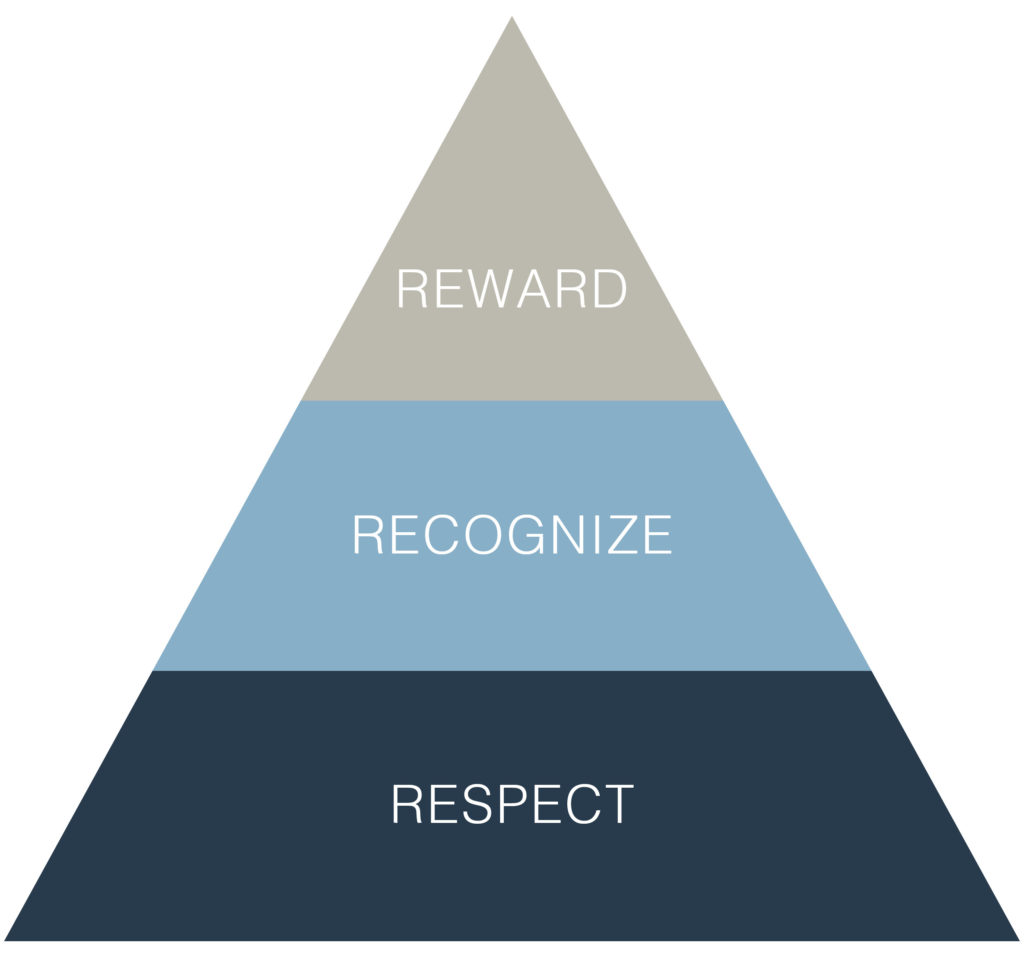Effective Employee Retention Strategy: The 3 R’s to Retaining Great Employees

What makes great employees great? It’s often a combination of experience, passion, and belief in the company’s mission. No new hire is guaranteed to be great, and often younger employees take time to grow into their greatness over time. Employee retention rate, especially for young professionals, is notoriously low. Many will look around for greener pastures or be recruited away, so how do you retain top talent and prevent them from moving on?
When you look at the greatest organizations in the present day, we see that the answer lies not just in competitive compensation, but in three simple words: respect, recognition, and reward. These retention strategies can either enhance or hinder employee satisfaction. The greatest companies and business owners in the world live out these three core values across their organization, which helps them keep their most valuable asset: their employees.

Respect
Respect may be the most important aspect of retaining great employees. Respect for employees lies at the heart of every great company culture. Companies must respect an employee’s ideas, beliefs, and hopes in all scenarios and situations. Every human being feels the need to be respected in their beliefs and the freedom to express themselves in the way they want. It is not enough to say that you respect current employees, you must show it and allow them to be themselves.
It’s important to continue to communicate the value a new employee brings to the company as well. You’ll want to maintain a positive mindset towards your business after the recruitment process to make job satisfaction more likely.
Respect means not only listening to talented employees’ ideas for the company but also putting those ideas to work. It’s important to ensure employees can voice their concerns and provide feedback to management at regular intervals through various methods such as one-on-ones, team meetings, and regular reviews.
If you carefully consider feedback from employees and work with them to develop those ideas, they will feel that their ideas matter and that those ideas have made a positive contribution to the company. Remember to listen to both positive feedback and notes of constructive criticism. This even goes for employees who have decided to move on from the company. Conducting exit interviews is a great way to get honest feedback.
If employees feel like their contribution is respected, they will know that their impact at the company is larger than the work that they perform on a day-to-day basis. Valuing employee input goes a long way in improving employee engagement.
Recognition
Recognition of employee accomplishments, both in and out of the work environment, can impact work satisfaction and provide social proof that employees contributed in a meaningful way to the organization. The best companies don’t just recognize employees at the end of the year, rather they find ways to recognize employees on a regular basis. One-on-one recognition only goes so far, which is why many organizations are using technology like digital screens to display employee or team accomplishments across corporate campuses, or are sending company-wide emails. This allows for individual employees to be recognized on a company-wide basis.
Recognizing an employee’s effort, and seeing others being recognized, motivates all team members to work harder and gain that social acceptance. There is a great feeling that we all have when we are recognized or congratulated for doing a good job; even if it is something small, we feel more confident and know that we are a contributing member to the company’s larger mission.
Reward
Reward is the last step to retaining your best employees. This employee retention strategy is a big one and if you can’t compete with your competitors, employee turnover is likely. Rewards are the cream on top for your employees. A reward is not only a motivating factor for working harder, but it is also a way to show employees that the organization relies on their efforts for success. When employees contribute to that success they should be rewarded in a monetary form in addition to social recognition. Monetary rewards are a way to personally recognize employees on an individual level and show that their efforts are not for nothing.
Rewards should come more than once a year, and they don’t necessarily need to be significant in size. Consistent rewards can be small gifts for successfully completing certain tasks or projects, like providing a $10 Starbucks gift card to employees who have to come in early to work on a project due later in the week. These little rewards display that the company is more human than a corporation, showing that employees are cared for and are more than cogs in a wheel used to drive company results.
Investments in professional development and growth opportunities that advance your employee’s career path are also worthwhile rewards for hard work. Another great employee development practice could be to set up mentorship programs. This gives employees the chance to network with people outside their direct team. These simple practices show employees you’re in it for the long haul with them.
Individual departments can be given budgets for smaller rewards on a consistent basis, while larger company rewards are reserved for special situations or as voted on by other employees.
Non-monetary rewards like healthy work-life balance, vacation time, adapting for remote work, benefits like health insurance and 401K, and stipends for gyms or coworking spaces, are also extremely valuable for employees. If you’re making good money, but overworking yourself in the process it’s counterproductive. It’s a good tactic for employers to work with employees to develop flexible scheduling that gives plenty of time for the day’s tasks valuing both the needs of their personal life and mental health.
Implementing the 3 R’s
The three R’s may not guarantee employee retention, but keeping these top of mind will create a company culture that is more human and employees will find it personally rewarding to work hard for the organization. They will feel that their ideas are contributing to something bigger than themselves by receiving social acceptance for their work and benefiting from monetary rewards for their innovative thinking and hard work. The benefit is a win-win for the company and employees alike.

